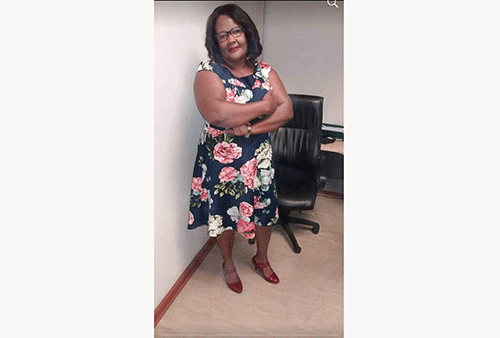They say that nothing beats a good dose of patience, persistence and perseverance. And for Cornelia Kauri Maharero, truer words have never been spoken. Maharero, a Survey Technician at the Ministry of Agriculture, Water and Land Reform’s Department of Survey and Mapping, is the epitome of tenacity.
Born in Windhoek some 49 years ago, the mother of three was initially hell-bent on becoming an officer in the Namibian Police Force after completing grade 12, but narrowly lost out on that dream.
“One had to go through an aptitude test before admission to the police college, and I failed that test by a single point,” she said.
But her desire to serve and protect did not end there as she now started pursuing joining the military as a second option.
“I played netball for African Stars Sports Club before joining arch-rivals Orlando Pirates. But in-between their games, I and other military hopefuls would play games for the Namibian Defence Force team with the hope that this would ease our entry during the selection process,” she revealed, adding that their attempts proved futile because the selectors opted for mostly male candidates from the Kunene region.
Getting In
Essentially, she got lucky and landed a position as an office administrator at the Namibia Council for Professional Land Surveyors and Survey Technicians (SURCON), an agency that was attached to the then Ministry of Land Reform.
Here, her duties included the registration of the surveyors, apprentice technicians and technical assistants, as well as payment processing and certificate preparations.
“That was in November 1996, and I stayed in this position until June 1998 when I started in my current position,” she added.
And then the quest for her to better herself educationally began, with her first stop being the University of Twente in the Netherlands in 2010.
“This was a fully-funded course, and there I completed my Diploma in Geo-Information Science and Earth Observation, specialising in Cartography,” Maharero said.
“This qualification is equivalent to the NQA 5 here in Namibia”.
In 2018, armed with experience and her diploma, she enrolled at the Namibia University of Science and Technology (NUST) for a bachelor’s degree in Geo-Information Technology.
“It may have taken me some time, but I am just glad that I eventually obtained my university degree. But prior to that, I also did refresher courses. One at Green Enterprises Solutions (PTY) Ltd ,which entailed the Omaheke Topographical Mapping in 2016, and another at the Universidade Catolica in Beira, Mozambique in 2012,” she beamed.
The latter course involved Integrated Planning with Modern Spatial Analysis Techniques for Sustainable Biofuel Production.
Maharero is glad to reveal that through her various work travels and campus training, she acquired numerous skills such as excellent working knowledge of geographical information systems, remote sensing and cartography. She is further skilled in image processing and geospatial production techniques, and is an expert in collecting, compiling and processing source materials for digitising.
“I further attained strong interpersonal, communication, presentation as well as organisational skills, which help me in my day-to-day activities as a survey technician,” she continued.
A day in the life
Said Maharero: “Digitising and the digital conversion of documents, capture, analyse and display geographical information, adding data in the cartographic database, data checks and quality control, thematic map productions as well as aerial photography interpretation, are my forte”.
With so many skills, one assumes that she would opt for the private sector, which some perceive as the hunting ground for the big bucks. Not Maharero. As a service-oriented person, the government was destiny from day one, she added.
“Apart from the perks such as study opportunities and the like, there is also peace of mind, and a greater sense of responsibility that comes with being a civil servant. This keeps me going,” she revealed.
In light of the above, she is quick to denounce claims that civil servants are lazy and borderline ineffective.
“It differs from person to person and department to department, I must say. In my division, we are results-driven, and delivering service to the public is a daily activity. As such, there is no room for slacking,” she observed.
Her plans are to see herself climbing the Geo-information ladder, whether it’s with the State or a parastatal.
Queried as to what she hopes will be implemented within the division to improve its output, she stressed that there is a dire need for them to go digitally.
“We deal with clients from abroad, and it will make the process easier and much more efficient if they can purchase the data and make their payments online instead of us having to use the courier services, for example,” Maharero noted.



